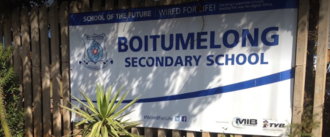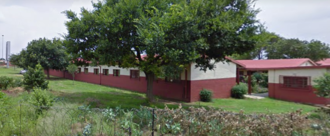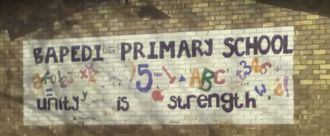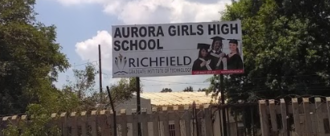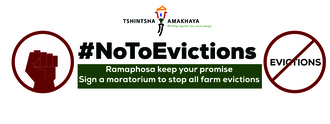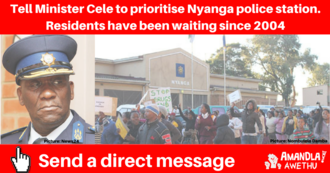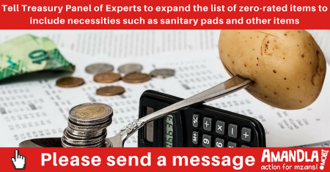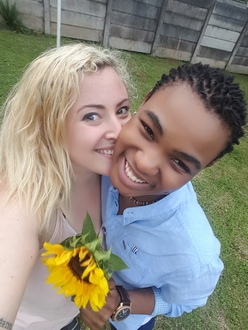- Featured
- Clean air
- Climate justice
- Consumer Rights
- Corporate Accountability
- Data access
- Early Childhood Development
- Economic fairness
- Education
- Electoral fairness
- Environmental justice
- Food justice
- Gender based violence
- Grants/social assistance
- Health
- Housing and infrastructure
- Industry interference
- Land Justice
- LGBTQIA+ rights
- Media/ information access
- Public transport
- Racism
- Reparations
- Safety
- Sanitation
- Service Delivery
- Sexual and Reproductive Rights
- Social justice
- Unemployment
- Womxn's rights/ gender equality
- Workers' rights
- More
-
Sign to demand healthy food for Boitumelong Secondary learnersEnsuring our children aren't hungry is our first priority as a community, but often the cheapest foods are unhealthy and can lead to health issues in our children, now and in the future, including type 2 diabetes, heart disease, high blood pressure, joint pain and certain cancers, which can be the result of lack of access to healthy food. We asked your school questions about what food most learners buy for lunch, and most said they buy kotas from vendors with sugary drinks. Learners also bought ice lollies, sweets and ice creams. This is not a balanced diet, and what we eat affects how much we can concentrate, and how sick we will get in the future. We use to have to just worry about HIV/AIDS, TB and other diseases, but now diseases like type 2 diabetes are increasing in our communities. The other reason we are getting sicker is because greedy junk food companies are aggressively marketing their products in our schools. But we can change this, if enough of us come together, we can ensure our voices are heard by the the MECs of Education and Health. If you don’t have email, you can join the campaign for free by dialing this code on your phone *134*1994*456#1 of 100 SignaturesCreated by amandla mobi member

-
Sign to demand healthy food for Batsogile Primary learnersEnsuring our children aren't hungry is our first priority as a community, but often the cheapest foods are unhealthy and can lead to health issues in our children, now and in the future, including type 2 diabetes, heart disease, high blood pressure, joint pain and certain cancers, which can be the result of lack of access to healthy food. We asked your school questions about what food most learners buy for lunch, and most said they buy kotas from vendors with sugary drinks. Learners also bought ice lollies, sweets and ice creams. This is not a balanced diet, and what we eat affects how much we can concentrate, and how sick we will get in the future. We use to have to just worry about HIV/AIDS, TB and other diseases, but now diseases like type 2 diabetes are increasing in our communities. The other reason we are getting sicker is because greedy junk food companies are aggressively marketing their products in our schools. But we can change this, if enough of us come together, we can ensure our voices are heard by the the MECs of Education and Health. If you don’t have email, you can join the campaign for free by dialing this code on your phone *134*1994*456#1 of 100 SignaturesCreated by amandla mobi member

-
Sign to demand healthy food for Bapedi Primary learnersEnsuring our children aren't hungry is our first priority as a community, but often the cheapest foods are unhealthy and can lead to health issues in our children, now and in the future, including type 2 diabetes, heart disease, high blood pressure, joint pain and certain cancers, which can be the result of lack of access to healthy food. We asked your school questions about what food most learners buy for lunch, and most said they buy kotas from vendors with sugary drinks. Learners also bought ice lollies, sweets and ice creams. This is not a balanced diet, and what we eat affects how much we can concentrate, and how sick we will get in the future. We use to have to just worry about HIV/AIDS, TB and other diseases, but now diseases like type 2 diabetes are increasing in our communities. The other reason we are getting sicker is because greedy junk food companies are aggressively marketing their products in our schools. But we can change this, if enough of us come together, we can ensure our voices are heard by the the MECs of Education and Health. If you don’t have email, you can join the campaign for free by dialing this code on your phone *134*1994*456#1 of 100 SignaturesCreated by amandla mobi member

-
Sign to demand healthy food for Aurora Girls High School learnersEnsuring our children aren't hungry is our first priority as a community, but often the cheapest foods are unhealthy and can lead to health issues in our children, now and in the future, including type 2 diabetes, heart disease, high blood pressure, joint pain and certain cancers, which can be the result of lack of access to healthy food. We asked your school questions about what food most learners buy for lunch, and most said they buy kotas from vendors with sugary drinks. Learners also bought ice lollies, sweets and ice creams. This is not a balanced diet, and what we eat affects how much we can concentrate, and how sick we will get in the future. We use to have to just worry about HIV/AIDS, TB and other diseases, but now diseases like type 2 diabetes are increasing in our communities. The other reason we are getting sicker is because greedy junk food companies are aggressively marketing their products in our schools. But we can change this, if enough of us come together, we can ensure our voices are heard by the the MECs of Education and Health. If you don’t have email, you can join the campaign for free by dialing this code on your phone *134*1994*456#1 of 100 SignaturesCreated by amandla mobi member

-
Stop all farm evictions1. Over 20 000 people are threatened by farm evictions in the Western Cape, Tshintsha Amakhaya is calling on president Cyril Ramaphosa to keep his promise following an announcement he made in Paarl in 2014 that there will be a moratorium as an immediate ban on legal and illegal farm evictions. Following the massive farm workers strike in De Doorns, Ramaphosa said, “We are calling on all farmers who have plans for evictions to stop the evictions.” However, the moratorium never came to effect. Instead, instances of farm evictions and human rights violations on farms persist. Today, Drakenstein Municipality has about 1,127 pending eviction matters. 2. The thousands of illegal evictions of farm workers and other farm dwellers continue to be evicted across the country despite the clear protections contained in the Extension of Security of Tenure Act 62 of 1997 (‘ESTA’) that a farm worker and persons living in the same dwelling as the worker may only be evicted: a) in terms of an order of the court b) once the court is satisfied that the eviction would be just and equitable c) and once the Land Claims Court has confirmed the order; 3. The great hardship, conflict and social instability caused by such evictions on a group of people already rendered vulnerable through their insecure tenure. 4. The disproportionate impact of these illegal evictions on women due to the commercial agricultural system that continues to confine women to an auxiliary labour category increasing their vulnerability to labour-related evictions. 5.The total system failure to protect the rights and security of farm workers and dwellers due to poor enforcement and resource endowment of ESTA; 6. The continued failure of municipalities to provide adequate alternative shelter as legislatively prescribed. 7. The Constitutional imperative, in section 25(6), to ensure that person whose tenure of land is legally insecure as a result of past racially discriminatory laws or practices, like farm workers and other farm dwellers, are provided with either legally secure tenure or comparable redress. Both farm workers and dwellers should be prioritised and be at the forefront of cases on which expropriation without compensation will be tested. “We used to work hard on this farm until we were retrenched in 1999. Nothing happened on the farm for 11 years and most of us couldn’t find work again. Now this farmer wants to evict us” This a desperate cry by a mother whose family is facing eviction from the farm she's worked and lived in for years [1]. She, like many others, now face a bleak future of being dumped on the road side with no protection and nowhere to go. President Cyril Ramaphosa made a promise in 2014 to stop farm evictions until people can be given dignified housing [2]. Even more recently, Deputy Minister Mcebisi Sikwatsha has seen with his own eyes the desperate situation farm workers are faced with [3] and also made promises to take it up with his Minister and President. We however cannot leave it to them. Thousands of illegal evictions of farm workers and other farm dwellers continue to be evicted across the country despite the clear protections contained in the Extension of Security of Tenure Act (ESTA). Places like Drakenstein are eviction hotspots with 1,127 pending evictions matters [4]. Evictions bring great hardship, conflict and social instability. The failure to protect the rights and security of farm workers and dwellers due to poor enforcement of ESTA and the failure of municipalities to provide adequate alternative shelter as legislatively prescribed need to be addressed. We need to stand with those being evicted and demand that government responds to the cries of the people. Will you tell President Cyril Ramaphosa and Minister Maite Nkoana-Mashabane to stop all farm evictions and help protect the rights and security of farm workers and dwellers? [1] [3] Western Cape could be testing ground for land expropriation without compensation, says minister, Barbara Maregele for Groundup News. 5 June 2018. [2] Ramaphosa asked to keep his promise to freeze farm evictions, Barbara Maregele for Groundup News. 5 April 2018. [4] Woman faces eviction after 51 years on a farm, Barbara Maregele for Groundup News. 31 May 2018.426 of 500 SignaturesCreated by Tshintsha Amakhaya

-
Waiting 14 years for a 2nd police stationJust two months ago, four people aged between 12 and 28 were killed in Nyanga. Another person was hospitalised [1]. Murders like this are not rare in the township. In the last two years alone, the murder rate has increased, with one in 206 people killed every year [2]. In the police ministry budget tabled in May, the Minister of Police announced that the residents of Nyanga will have to wait until 2023 for construction of a second police station. This despite the fact that the one currently servicing the community is severely overstretched and doesn’t even have enough space for all its police officers. For years now, the people of Nyanga have lived in terror. The township is known as Mzansi’s murder capital. The Department of Police has for years ignored calls for a second station. But with support from amandla. mobi, the calls for the police station grew louder, and in October a piece of land to build a police station was identified [3]. But now the current Minister, Bheki Cele, has shown that he too is in no rush to move it forward. His own budget speech, but if enough of us take action this is our chance to get the Minister's attention and show him that the people of Nyanga, along with the amandla. mobi community are demanding that he takes action. [1] Four killed in Nyanga shooting, Shamiela Fisher for EyeWitness News. 4 April 2018. [2] Nyanga, Western Cape, has a murder rate of one in every 206 people, Tom Head for The South African. 26 October 2017. [3] Land near Nyanga identified for a new police station, Okuhle Hlati for Independent News. 27 October 2017.111 of 200 SignaturesCreated by Amandla.mobi Member
-
Stop taxing my periodThousands of amandla. mobi members have fought hard to make free sanitary products a reality for millions of girls. Unfortunately, for the households that could put a few rands together to buy a pack, the VAT hike announced earlier this year has made it even more expensive, meaning more people who need sanitary towels could go without. But right now, we have an opportunity to change that. Public submissions to the expert panel investigating the expansion of zero rating to more items was extended. But it ends on June 4, 2018. Send the panel a direct message telling them to recommend that sanitary products are included in the list of essential zero-rated products. People who get periods will buy up to 17 000 sanitary pads or tampons in their lifetime [1]. This basically means that the average person could spend up to almost R40 000 on sanitary pads in that time [2]. This in a country in which over 50% of the population live in poverty. The VAT hike has had an impact on the cost of living in Mzansi. People are spending much more on essential food items, reducing how much they have for other needs. And living a decent, dignified life requires so much more than food. Our community exists to primarily protect us, Black women. You, and over two hundred thousand others have taken action to make this real. And we need you to once again stand with us and make sure the panel recommends dropping the tax on our periods. [1] A guide to 'alternative menstruation': Save money and the world during your period, Pontsho Pilane for Bhekisisa. 31 Oct 2016. [2] Why treasury won't support a fall in the tampon tax, Pontsho Pilane for Bhekisisa. 5 Dec 2016.680 of 800 SignaturesCreated by Amandla.mobi Member
-
Life Orientation must not be scrapped in Grades 10-12Learners need LO in Gr 10-12 and many benefit a great deal from this vital subject. The Minister made the promise in 2015 that LO will not be scrapped, but strengthened. So don''t break this promise! The implications of taking out LO will mean that teachers will not specialise in LO at universities if it is a small subject that only goes to grade 9. It will mean the end of the subject. There are many great LO teachers who are devastated. Learners only take career ed seriously in Grades 11-12. LO teachers are heartbroken at the sad news of history usurping LO. This was not a democratic decision not were LO experts consulted. To pit one subject against the other is unwise. Instead, the Department can create a subject called which can include African history and herstory, African role models and Governance, Constitution, Voting, Human Rights, etc. LO topics are vital to learners in Grades 10-12, they give in-depth career education, sexuality education, create awareness on gender issues, improve study and exam writing skills, stress management, substance abuse, environmental protection and relationships, diversity and self-esteem enhancement. They also promote Indigenous Games. [1] Motshekga defends life orientation, The New Age. 15 Feb 2017.2,353 of 3,000 SignaturesCreated by Edna Rooth
-
Isolate Apartheid Israel!South Africans were horrified by the targeted shooting of peaceful protesters in Gaza by the Israeli Defence Force that left around 60 people dead and many hundreds wounded on 14 May 2018. It was seen for what it is – a coldblooded massacre, reminding us when we were shot down for peacefully protesting against apartheid in Sharpeville and again in 1976 in Soweto when children were shot and killed. This was not the first time the Israeli occupation force has carried out atrocities and it won’t be the last unless the world acts now. It was only by internationally isolating apartheid South Africa in support of popular uprisings, strikes and armed struggle that we were able to put enough pressure on the regime. Likewise, we need to intensify pressure on our government to immediately cut diplomatic ties with racist Israel, signalling to the world – and especially to the Palestinian people – that we have not forgotten their support for us during our Struggle. Merely recalling our Ambassador is not sufficient. We must cut all diplomatic ties, expel the Israeli Ambassador from Pretoria and heed the call of the international BDS movement and demand complete trade sanctions; sport, cultural and academic boycotts; disinvestment and an arms embargo in support of Palestine that belongs to all who live in it. Since 1994, South Africans have called on the government to impose comprehensive sanctions against the apartheid Israeli regime: • a ten thousand strong march in Durban during the United Nation’s World Conference Against Racism in 2001 where the “Second Anti-Apartheid Movement” was declared and a boycott, divestment and sanctions campaign against Israel adopted by representatives of South African civil society led by prominent liberation movement veterans; • an equally strong march at the World Summit on Sustainable Development in 2002 in support of the Palestinian struggle and against the presence of an Israeli delegation including Shimon Peres; • the refusal of dock workers in the port city of Durban to offload an Israeli ship in 2009 in the wake of Israel’s ‘Cast Lead’ assault on Gaza • the decision in 2011 by the Senate of the University of Johannesburg to sever ties with Ben Gurion University. • On the 9th of August 2014, between 150 000 to 200 000 South Africans marched in Cape Town against atrocities in Gaza and for full sanctions against Israel. It was the biggest march in South Africa’s history and continues solidarity activity since the first South African democratic elections in 1994. • The Council of the Tshwane University of Technology (TUT) resolved that TUT would not forge any ties with the State of Israel or any of its organisations and institutions on the 24th of November 2017. In 2014 President Zuma sent Aziz Pahad as a ‘peace envoy’ to Israel. We still have not received the outcome of Pahad’s trip. At the same time Deputy President Cyril Ramaphosa, answering questions in the National Council of Provinces, called for “constructive engagement” with Israel – a phrase used by Ronald Reagan and Margaret Thatcher to justify their relations with apartheid South Africa. It is clear that Israel is not interested in peace as it continues to violate international law. The ANC Conference in 2017 adopted a resolution to downgrade our Embassy in Tel Aviv. President Ramaphosa has subsequently, on more than one occasion, reminded South Africans of the ANC resolution as a matter that government has to deal with. Minister Naledi Pandor, in the debate following State President Ramaphosa’s SONA address in February, went further and said that South Africa will “cut diplomatic ties” with Israel. We now demand implementation! We call on the South African government to: * Permanently recall our ambassador from Israel; * Expel the Israeli ambassador from South Africa; * Prosecute South African citizens that join the Israeli army in any capacity; * Stop SAA code sharing with Israeli airline 'El Al'; * Prohibit South African companies from trading with Israel; * Prohibit Israeli funding of South African political parties; * Work to persuade African Union member countries to adopt similar policies; * Engage with all South African organisations in the Palestinian solidarity movement. For more information please contact [email protected]27,069 of 30,000 SignaturesCreated by Roshan Dadoo
-
24 hours to have VAT removed from more essential itemsBefore the VAT increase kicked in on 1 April 2018, National Treasury had announced that it would set up a panel of experts to consider and review the country’s current list of items that have been zero rated for VAT. We know that the VAT increase has hit the poor and those who rely on social grants, the hardest. National Treasury set up an independent expert panel to look into removing VAT from more items and is calling for submissions. But we have only 24 hours to do this. We can pressure government to review the current list of zero rated items so that we give some relief to poor households. Currently, Mzansi has 19 basic food items on the zero rated list [1]. This includes dried beans, samp, maize meal, rice, milk, tinned pilchards, brown bread, eggs and vegetables, as well as illuminated paraffin. The zero rating does not apply to items such as sanitary products, soap, stationary, margarine and school uniforms to name a few. The poor cannot live off just 19 zero rated items. Many of our leaders seem to acknowledge that the VAT increase is a problem, and we can use this moment to continue to reduce the impact of the VAT hike on the poor, while working towards holding Treasury and Parliament to account. [1] Zero-rated and exempt supplies, National Treasury website. [2] https://www.news24.com/SouthAfrica/News/treasury-calls-for-publics-input-on-adding-items-to-zero-rated-vat-list-201805171,493 of 2,000 SignaturesCreated by Amandla.mobi Member
-
Spousal Visa for LGBT CoupleWithout a spousal visa, Wendy cannot: Enroll in any institution Register for school yet she was accepted for 2017 Get formal employment Get proof of residence Apply for a driver's licence Open a bank account Travel outside of South Africa which means the couple cannot... visit her FAMILY! How can your department infringe so many rights? Nomfundo and Wendy have followed the law and procedures necessary for a spousal visa. It is not fair that their relationship is not recognized and acknowledged in the same way as a heterosexual couple. The law and the Constitution protect them. The Department of Home Affairs needs to be held accountable!1,080 of 2,000 SignaturesCreated by Nomfundo Ngidi
-
Zara pay back the money to Laduma NgxokoloMa'Afrika, Ours is a history of ongoing exploitation from white monopoly capital, and this time the brand Zara has decided to appropriate Laduma Ngoxolo's designs, by distributing his socks on their website (which they have since taken down). Despite this a small town boy, who worked extremely hard building his business in the Eastern Cape has to utilize his resources to take on an established multi-billion dollar company that tried to rip him off. Since Laduma will have to use his own resources, it is time for South Africans to come together to create a dent in the Zara wallet. Cultural appropriation and exploitation is a tale as old as time, where white capital benefits from the knowledge created in indigenous communities. Boycott all Zara stores in order to send a clear message that we will not tolerate the exploitation of our artists and our people! #BoycottZara #LocalArtMatters #LocalArtistsMatter [1] Press release from Select Committees Chairperson: https://www.parliament.gov.za/press-releases/select-committees-chairperson-welcomes-zaras-decision-remove-copied-designs [2] Press release from MaXhosa by Laduma https://www.facebook.com/MAXHOSA/posts/159243213415892134 of 100 SignaturesCreated by P M
.png)
